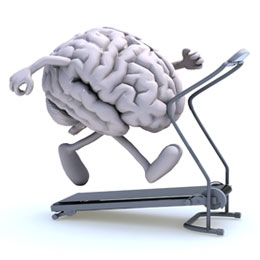Brain health is crucial to our survival. The brain controls our entire body and how we think and move. But as we age it can be one of the things that let us down and cause rapid deterioration of our health. Are the forgetfulness and ‘senior moments’ an inevitable part of our ageing process? Or are we able to provide nutrition and brain exercises in our lifestyle now to help reverse, or to at least minimise, further damage that leads to dementia or Alzheimer’s disease?
Increasing amounts of research suggest that simply power of exercise can keep our mind sharp. Research in a cohort of older adults with ages ranging from 60-80 years of age had their brain activity, physical activity and aerobic capacity measured. They found that those who were more physical active had better oxygenation of the brain and better patterns of brain activity, especially in the hippocampus and the connecting of certain parts of the brain that are related to cognitive function. The most interesting part of the study was the physical activity was not athletics but informal forms of activity such as gardening, walking, and simply moving each day.
The old adage that ‘you can’t teach an old dog new tricks’ is a thing of the past. Your brain is capable of rejuvenating and regenerating itself throughout your life. It was once believed that the neurons died and there was nothing that we could do as we age – hence the attitude that our memory declined and was more or less inevitable part of ageing. Fortunately this is simply not true, especially if you incorporate exercise in your daily regime. A psychiatrist called John Ratey, who wrote the book Spark: The Revolutionary New Science of Exercise and the Brain, states that there is overwhelming evidence that exercise produces large cognitive gains and helps fight dementia. Exercise participants have larger areas of grey matter in hippocampal region of the brain, which means higher cognitive function.
During exercise nerve cells release a protein called neurotrophic factors, with one in particular called brain-derived neurotrophic factor (BDNF), which triggers chemicals to promote neural health and directly benefit cognitive function, including learning.
Kirk Erickson’s research showed that in the 60-80 year categories those who walked a minimum of 30-45 minutes per day increased the volume of their hippocampus by two percent. This is significant, as people in this age category generally are losing one to three percent per year of hippocampal volume. And the change in the size of the hippocampus was correlated with changes in the blood levels of BDNF. He also found that people that exercised with higher fitness levels were associated with a larger prefrontal cortex.
A team from the University of Edinburgh followed more than 600 participants starting at age 70 and kept detailed logs of their daily physical activity, mental, and social habits. After three years they imaged their brains for age-related changes, such as shrinkage and damage to the white matter (electrical wiring of the brain). Not surprisingly the participants who engaged in the most amount of physical exercise showed the least amount of brain shrinkage. They also noted there was reduced plaque formation in the physical activity group.
Although most research focuses on the ageing brain and exercise benefits, the brain can benefit from exercise at any age. A review of 14 studies demonstrated that the more physically active school children are, the better they do academically. The hypothesis why this occurs could be related to:
– Increased blood and oxygen flow to the brain;
– Increased proprioceptive awareness from doing coordinated movements which drives neural stimulation into the brain from proprioceptive (balance and position sense) input;
– Increased levels of norepinephrine and endorphins resulting in a reduction of stress and an improvement in mood;
or
– From increased growth factors that help to create new nerve cells and support synaptic and cortical plasticity.
The University of Minnesota collected data of 2,700 US adults over 25 years and found that those that had a greater cardiovascular fitness in their teens and 20s scored much better on cognitive test in their mid 40s and 50s. For each additional minute they spent on the treadmill during the initial test, they were able to accurately recall 0.12 more words at a follow up in 25 years. The fitter subjects also scored better on reaction speed and mental agility test.
Remember that a failing brain can be reversed or even at best slowed. Exercise can help reduce the amount of shrinkage that happens. Along with some crucial lifestyle choices such as
– Avoiding sugar and refined fructose in all its forms;
– Avoiding inflammatory foods that have gluten and casein;
– Aiming for a diet that is organic and free from pesticides and agricultural chemicals like glyphosate;
– A diet rich in folate-rich vegetables like spinach and swiss chard;
– Eating a healthy amount of healthy fats, including animal-based omega-3, organic butter, coconut oil, organic ghee, olives, nuts like pecans and macadamia, free-renee eggs, alaskan salmon, and avocado;
– Optimising your gut flora with fermented vegetables and foods like sauerkraut and kombucha, and having a high-quality probiotic;
– Minimising stress levels;
– Getting regular sleep and not staying up late;
– optimising your vitamin D levels;
– Eliminate mercury from the body including dental amalgam fillings which contain 50 percent mercury by weight;
– Avoid aluminium in antiperspirants and non-stick cookware, etc;
– Lastly challenge the mind daily. Try and learn something new on a regular basis from learning a musical instrument to learning a whole new concept.
The brain is a muscle and it needs to be nurtured and exercised regulary.
If you would like more information or would like to book an nutritional appointment at Neurohealth – please call the clinic on 9905 9099 or email us admin@neurohealthchiro.com.au or fill in the contact form from our website www.neurohealthchiro.com.au
Sign up to receive Neurohealth Chiropractic’s free monthly health newsletter on the Right Hand Side of this page. Filled with great information and lots of easy health tips to keep you at Optimal Health!




